Advertisement
Boston-Area Companies Push For Robot Workers In Warehouses Under Holiday Crunch
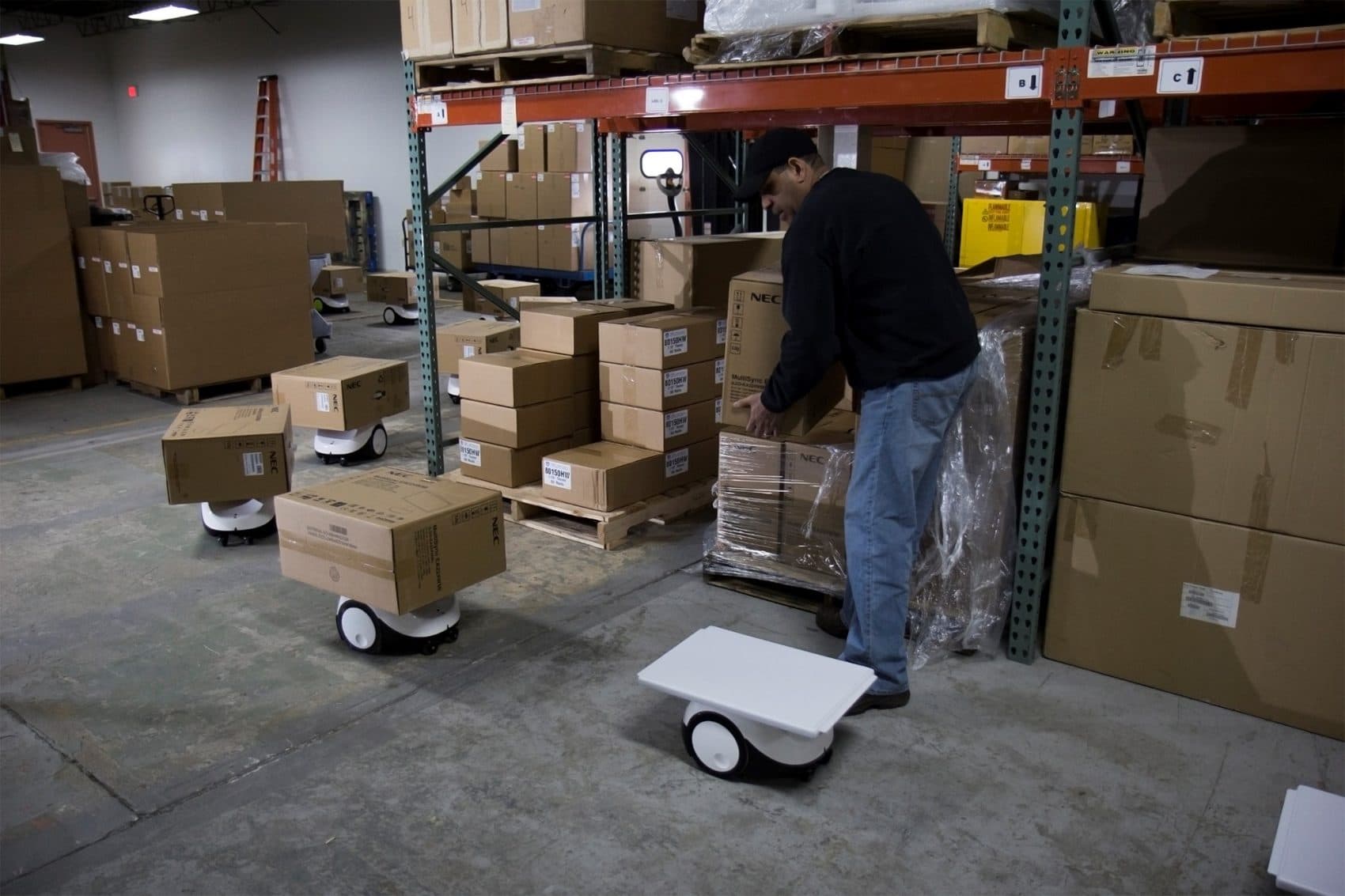
Every year at Christmas, warehouses — brimming with gifts to be given — scramble to find workers.
The jobs to be done require standing for hours and packing up all of our online shopping.
But as some warehouses still search for human bodies to handle things with care, some companies around Boston say it's time to deploy the robots.
Amazon's Influence On The Robotics Sector
In early 2012, Amazon purchased Kiva Systems, a robot-maker in North Reading. That acquisition meant Amazon essentially took Kiva robots off the market.
"The rest of us customers were left out in the cold," said Bruce Welty, who was then working for Quiet Logistics, one of Kiva's non-Amazon customers.
For Welty, Amazon's acquisition was a big problem. He'd been in the warehouse distribution business for years, and he relied on Kiva's robots.
"We had to replace that Kiva robot, so we went out to try to find one," Welty said. "We couldn't find one. So we built our own."
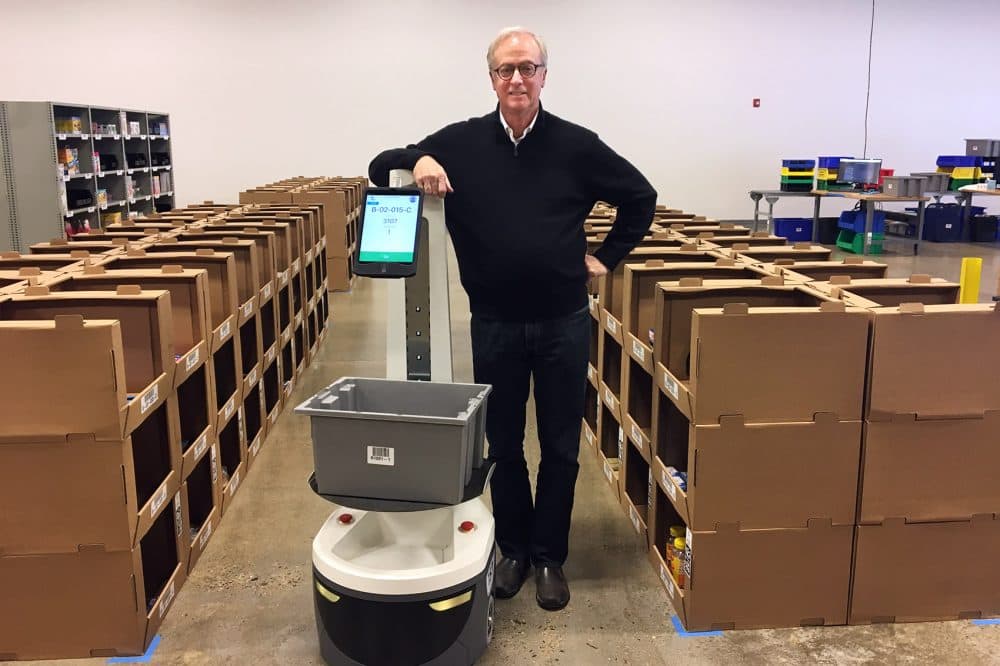
In 2013, Welty started working on what is now Locus Robotics in Wilmington. The company spun out of Quiet Logistics in 2015.
He said Kiva pioneered the warehouse robot industry, but in the years since, the technology has advanced, and the costs have dropped, making it possible to create previously unimaginable changes with autonomous navigation.
"We can say to a robot go from point A to point B, and we don’t have to tell it how to get there. It will figure it out," Welty explained, as a couple of robots with tote bins rolled by. The robots, which have iPads attached to them, were going about 4 miles per hour, around cartons and shelves inside a mock Locus Robotics warehouse.
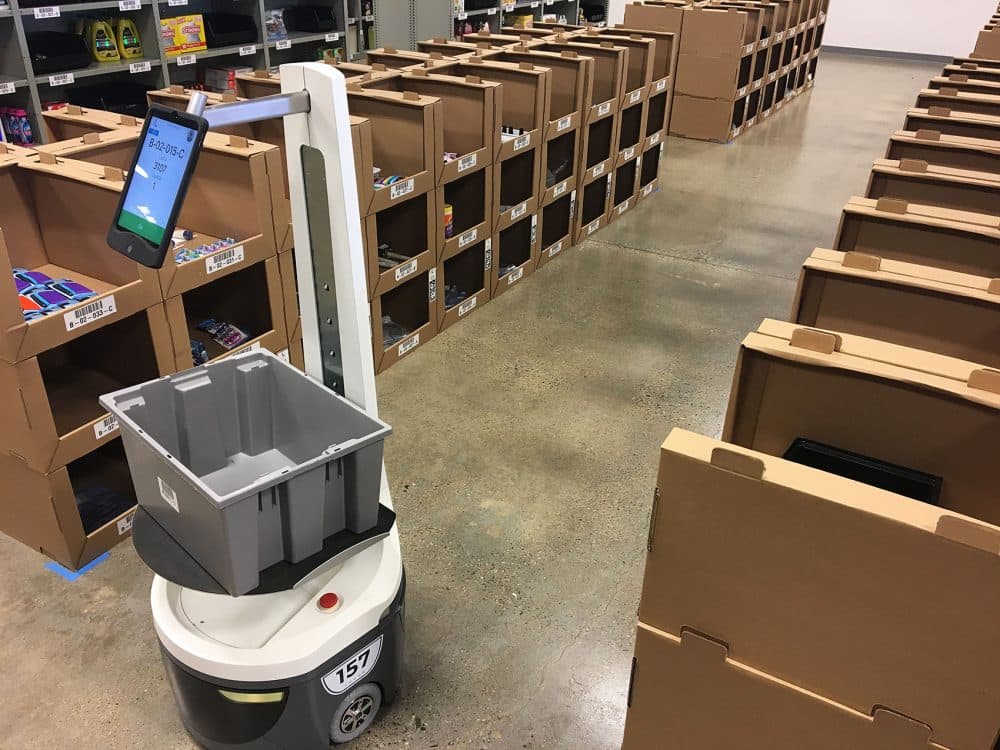
"(The robot) just saw that we were standing there, and it turned around and said 'oh, I can't go that way 'cause we have obstacles.' So it decided to take an alternative route," Welty said, pointing to a robot that zoomed around the corner.
As the retail industry has shrunk, e-commerce has grown, creating thousands of new jobs in the warehouse sector: people to pick products off of shelves and pack boxes to deliver to your home.
In fact, federal statistics show nearly a million people now work in warehouse and storage jobs.
And in the next decade, the Bureau of Labor Statistics estimates this industry will grow jobs by some 21 percent — that's far more explosive than the average job growth in the U.S. economy.
But these new jobs are not replacing old retail jobs in the same market. Warehouses are often built where there's large open land and not necessarily the population to support their job demands.
Advertisement
"There is absolutely a need for more pickers and packers out there," said Steve Banker, vice president of supply chain services at ARC Advisory Group in Boston.
People who observe the industry also said there's a huge labor shortage.
"There's other places people would rather work. It can be a very strenuous job," said Banker. "It can be both physically challenging and mentally stressful."
And that's why Welty sees "unlimited" demand for his robots.
"It’s hard to size the market, but if you realize that, right now, about 70 to 80 percent of the warehouses in the world are not automated, you can kind of imagine there’s a huge opportunity out there," he said.
Welty, like other robotics executives, said he is hesitant to name specific customers, but he mentioned DHL now uses Locus robots.
Locus rents out its robots — 10 at a time to start — and Welty said that thanks to the holidays, they've doubled their fleet in the last couple of weeks.
Automation: A 'Key To Success,' Or 'The Only Option'
When you talk to folks in the industry, you'll hear a common theme: Kiva, now Amazon Robotics, is a major reason why the Boston area has become a leader in warehouse robotics.
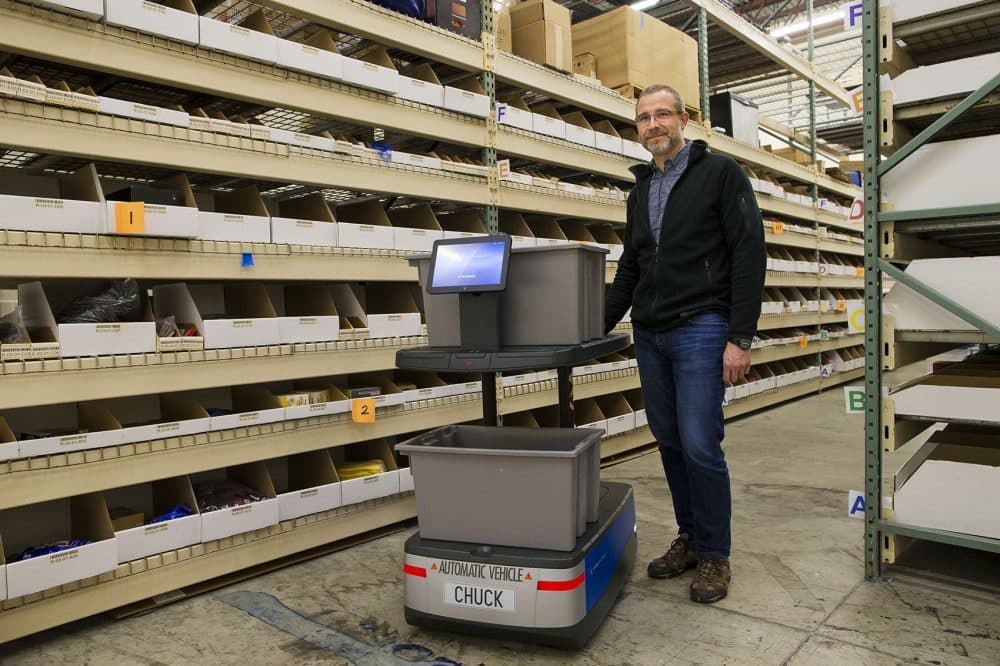
Jerome Dubois, co-CEO of the Waltham-based robot-maker 6 River Systems, worked at Kiva for years. About a third of his staff are ex-Kiva employees, too.
Dubois said Kiva was powerful, but required a lot of infrastructure. Humans and robots didn't exactly collaborate. The robots were generally quarantined in caged-off sections of the warehouse.
The new generation of robots being designed around Boston focus on human-robot collaboration. They're smaller, more flexible and cheaper. For $250,000, Dubois said a company can get eight robots up and running in a month.
The speed and price, he insisted, is game-changing in an industry that's used to bulky equipment and conveyor belts bolted to the ground.
6 River Systems nicknames its robots Chuck. They're a little larger than what you see at Locus, but their design builds off the same overall idea - autonomous, collaborative robots with tote bins.
"We use fancy algorithms — some people would call them AI — to assign orders together, and group them together onto the Chuck, to reduce the amount of walking," explained Dubois.
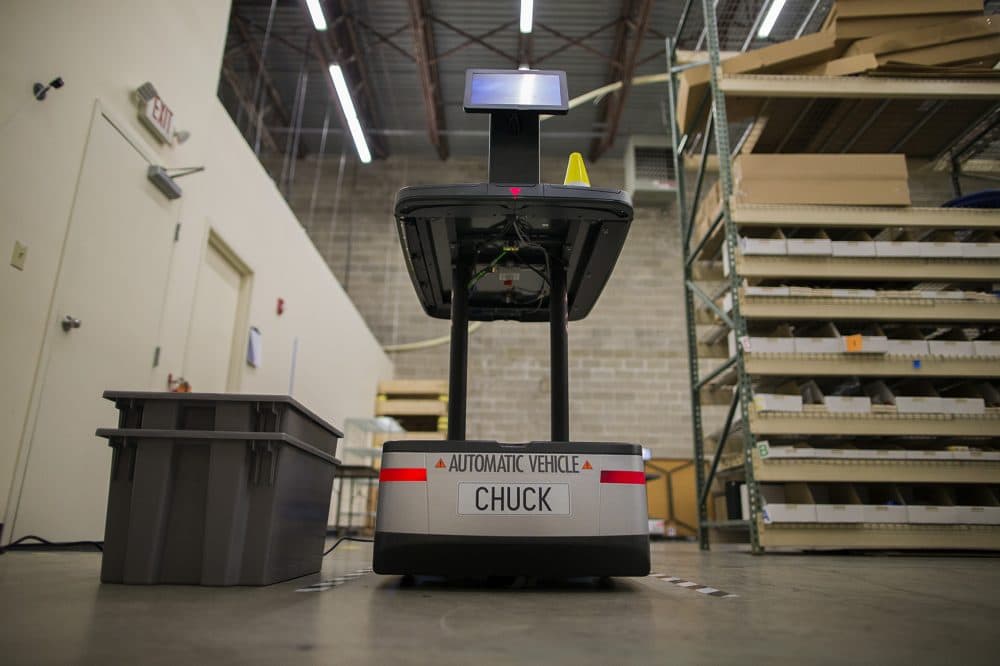
Chuck drives around, like a self-driving car with sensors.
"As he's going around things that he doesn't recognize, he slows down, and he starts beeping to let that thing know that it's around," said Dubois.
And when he arrives at the right stop — say at the bin for white t-shirts — a human will actually pick up the white t-shirt and drop it into the tote the Chuck is carrying.
"Doing this job without a Chuck means that you’re pushing a very heavy cart around the warehouse, you’re walking tens of miles a day," said Dubois. "You’re pushing something that weighs somewhere between 100 and 600 pounds all day long."
For all that effort, warehouse workers make roughly $15 an hour nationwide, and many don't stay in the jobs long-term.
As warehouses experience constant turnover, people like, Daniel Theobald, founder of Vecna in Cambridge, see a growing appetite for robots.
"I think everybody’s realizing that in order to compete in today’s global economy, automation is the key to success," he said.
"We’ve developed into an impatient race," he said. "What’s been done now is using automation to meet our essentially unreasonable consumer expectations: 'I want what I want, I want it now.' "
Daniel Theobald, co-founder of Vecna
Data suggests he's right about automation. The market research firm Tractica sees logistics as one of the fastest growing markets for robots. It's expected to quadruple and reach nearly a million by 2022.
Vecna has a slightly different model than other companies. It's more research-focused, and has spent millions developing an autonomy brain that can fit on a range of robots, some of which are powerful enough to lift a shelving unit.
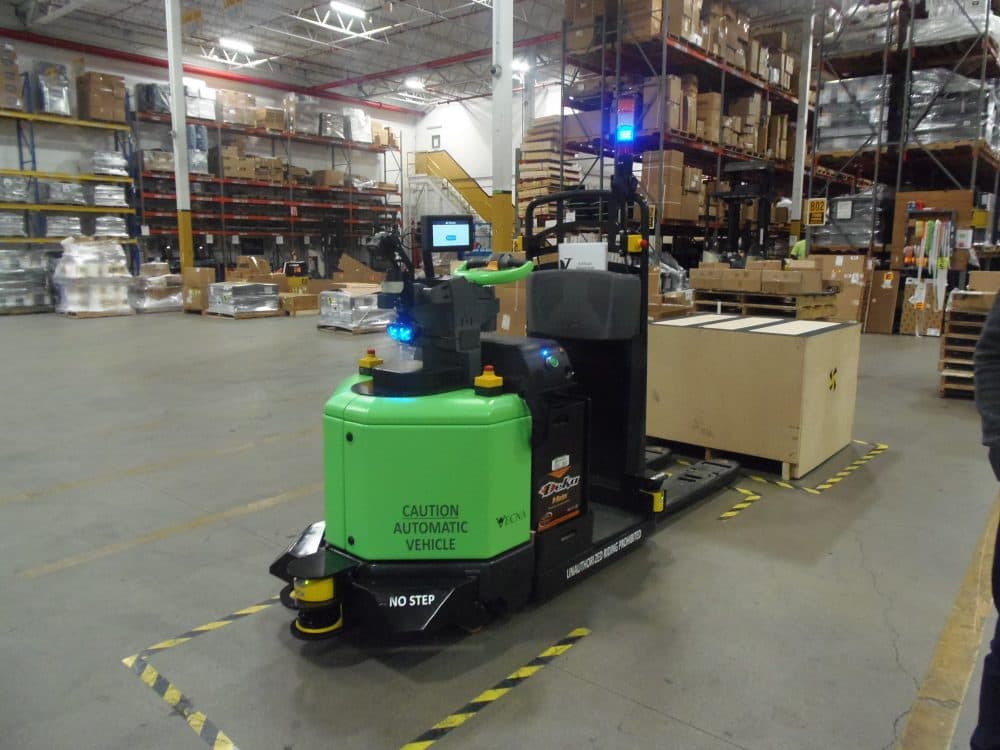
"You can take one of our robots ... a tugger that can handle 4,500 kilograms and four trailers behind it," said Theobald, "you can introduce it into the environment, drive it around, (and) it basically learns the environment much like a human does."
He, too, said the entire industry has changed largely because of Amazon.
Amazon has proven that logistics can be a competitive advantage.
The tech giant now has 100,000 robots in its warehouses around the world, according to an Amazon spokeswoman.
Theobald said Amazon showed warehouse executives that customers want and expect speed when they order online.
"We’ve developed into an impatient race," he said. "What’s been done now is using automation to meet our essentially unreasonable consumer expectations: 'I want what I want, I want it now.' "
Theobald said that because many customers demand accurate orders filled within hours "automation is the only option," particularly for smaller retailers, if they want to survive.
And for that, we have Amazon to thank, or to blame. Either way, in the years to come, your holiday gifts are likely to have been touched by a robot.
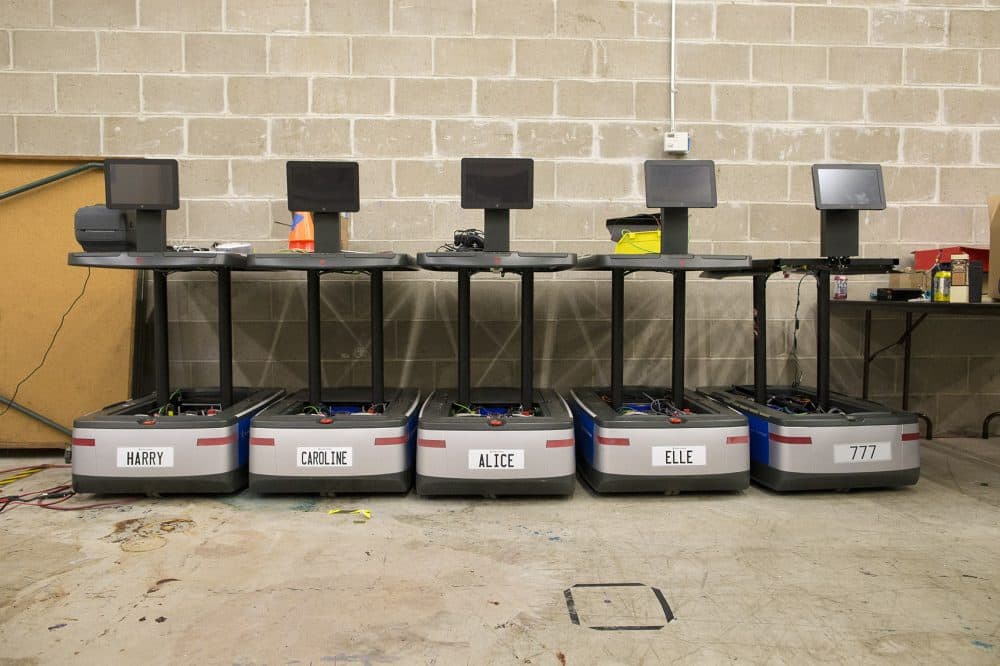
This segment aired on December 22, 2017.
